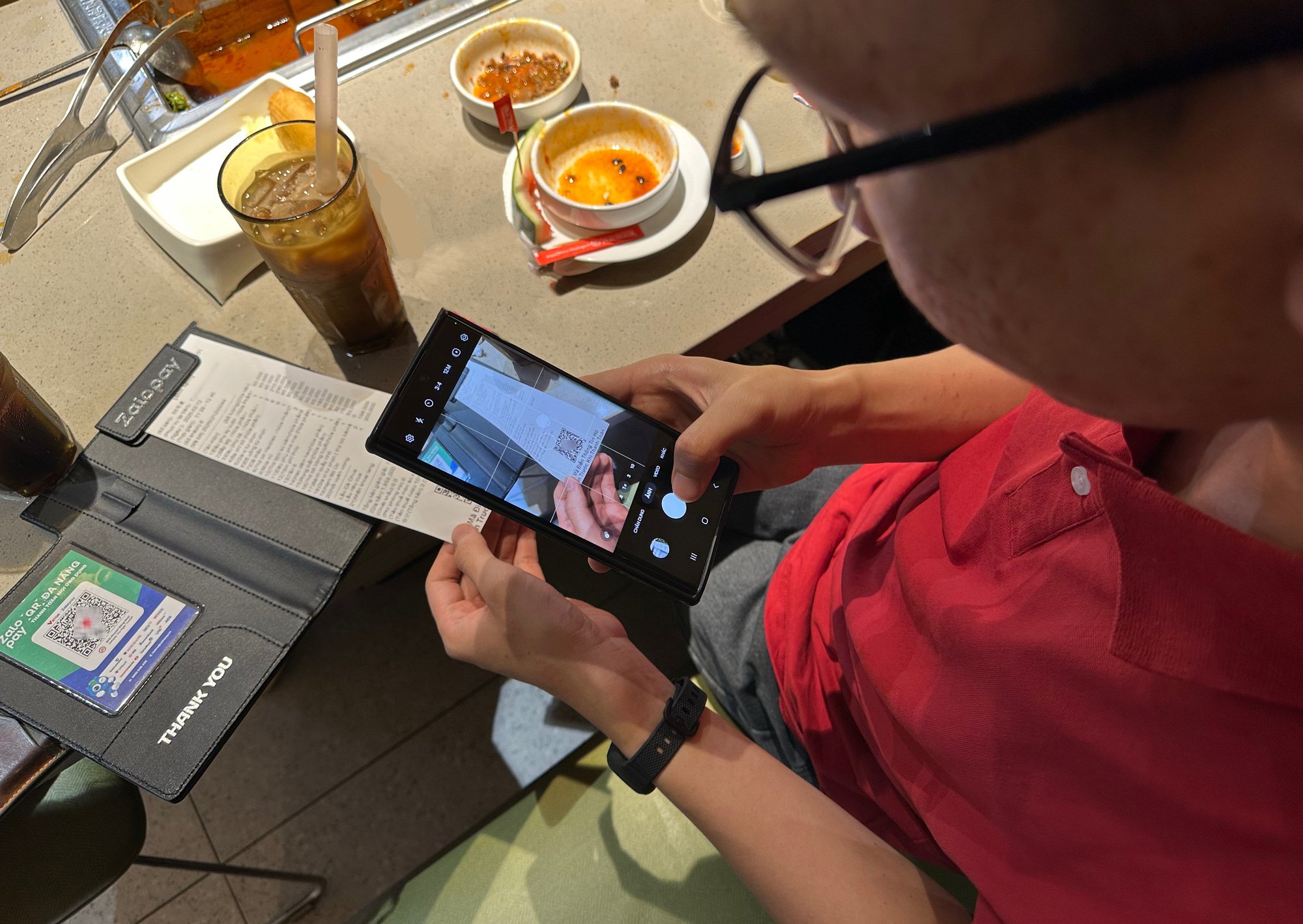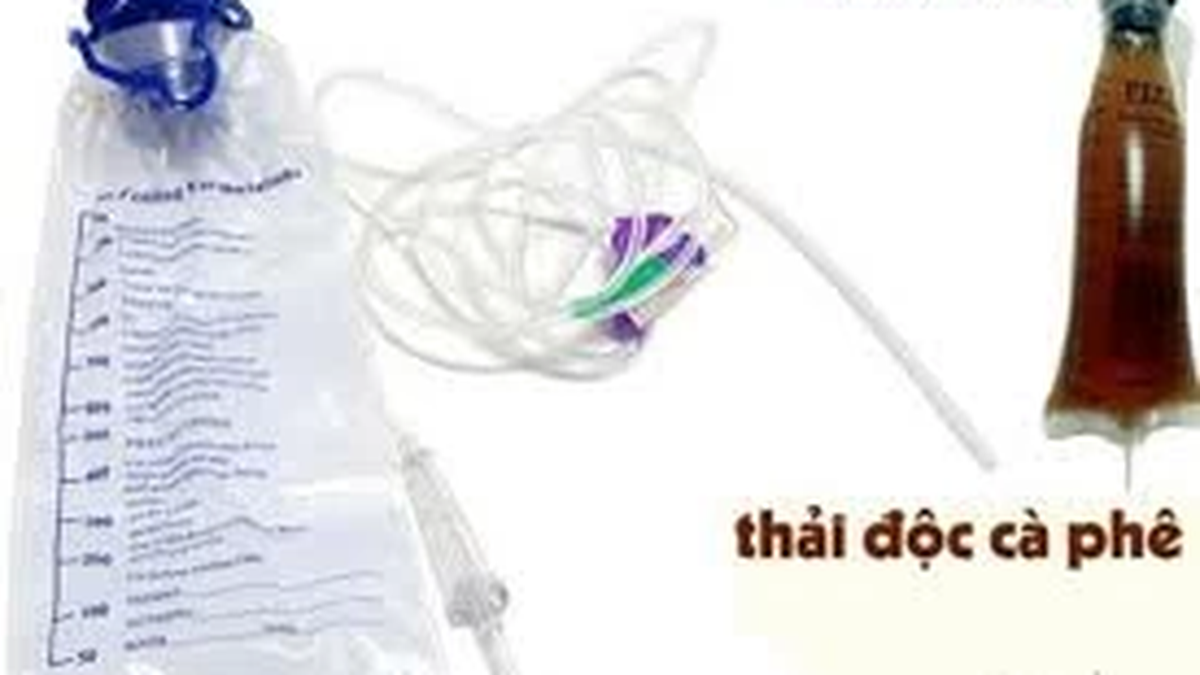In the era of bank transfer payments, the matter of tips for restaurant staff has also changed accordingly.

When transferring money to pay for food bills, many people still keep the habit of tipping the service staff - Photo: YEN TRINH
Meeting on New Year's Eve at a beer bar in District 1 (HCMC), after transferring money to pay the bill of 2.1 million VND, Mr. Xuan Phuong (45 years old, living in Tan Binh District) and his group of friends asked for the employee's account number to scan the QR code to tip 200,000 VND.
Always leave cash to tip the staff
With a cheerful voice, Mr. Xuan Phuong said: "Every time I go out to eat or drink, I always tip my staff. Because when I was in school, I worked as a waiter in a restaurant, so I know this job is hard and the salary is not high."
According to him, happy and enthusiastic employees will easily receive higher tips because customers feel comfortable.
Nowadays, most of the bills are paid by bank transfer, but he still keeps the habit of tipping his employees in cash. He often keeps a few hundred thousand dong in his pocket in case the transfer is not successful.
Regarding tips, if you eat lightly, you leave an extra 10,000 - 20,000 VND depending on the amount on the bill. If you go to a pub, you leave about 100,000 VND, and if you go in a large group or stay for a long time, it is 200,000 VND.
Usually, the person who transfers the money will calculate the tip himself, then the whole group will divide it.
"Once I ran out of cash in my wallet, so I asked for the employee's account number and transferred the money. He accepted it freely, because most waiters also want to earn extra income from this," he said.
Similarly, Mr. Le Bach (35 years old, living in Thu Duc City) said that when sitting at a drinking place, he often tips 15,000 - 30,000 VND, usually the change from the bill. Or if he transfers money, he still has cash to tip separately.
When going out to eat together or to a restaurant, he and his friends or colleagues will tip the staff 200,000 - 300,000 VND, "because in restaurants there are more waiters and it takes more effort."
Keeping the habit of rewarding service staff, Mr. Bach gave the reason because he saw that most of the friends were students so he wanted to share a little.
"I think that's also the culture of today's service market in some types of businesses like restaurants and tourism , where a significant portion of employees' income comes from tips from customers. And there's also a give-and-take. If they serve attentively and happily, we should give them a little reward," he confided.
Transfer tips according to the bill, the restaurant sends them back to the staff
Similar to Mr. Xuan Phuong and Le Bach, Ms. Ngoc Dieu (32 years old, living in Phu Nhuan district) often estimates the bill and type of restaurant to send appropriate tips.
When eating at restaurants where the staff are attentive, pouring water, picking up ice..., she and her friends usually tip around 100,000 VND. For simpler meals, they leave the remaining money.
When paying by bank transfer, she and her group of friends always transfer the tip to the restaurant bill and let the staff know. Or when she has cash in her wallet, she usually takes it and gives it directly.
On the other hand, the transfer is so convenient that she thinks that if she transfers a small amount of money to pay a separate bonus, it is not a problem.
"The important thing is that I give compensation as a thank you for the staff's service, and they are all happy to receive it," she said.

Training restaurant staff is also a way to share their hardships.
The allowance depends on your heart, habits, and the type of food you eat. That amount added together is income, to encourage you in the process of hard work.
However, in reality, when paying by bank transfer, the habit of tipping seems to be less. Maybe because of the thought that transferring tips together with the invoice is not very convenient, or transferring too little to the employee separately is embarrassing...
Mr. Dang Thai Duong (owner of a restaurant on Hoang Sa Street, District 1) said that the restaurant has 2-3 employees, and customers usually pay in 3 forms: cash, bank transfer, and card.
"When transferring money or swiping a card, if a customer tips, they usually transfer the remaining amount. When the cashier takes a picture of the transfer receipt, they will note the tip. After about 3-5 days, they will summarize the tip amount, I will check it against the receipt and then transfer the tip back to you," Anh shared.
In addition, some customers choose to tip the staff by transferring money or giving cash, usually 20,000 - 100,000 VND/time. According to him, customers often have the habit of rounding up the bill and tipping the excess, for example, if it is 149,000 VND, they will give 200,000 VND.
Mr. Duong's restaurant does not regulate whether employees receive general or individual tips, but depends on the form of gratuity from the customer.
Some people do not have the habit of tipping when dining out. If they eat out with a group of friends, they will tip a small amount in cash because they are shy in front of friends or tipping in a group. Switching to bank transfer, tipping the service staff is no longer necessary.
Like Mr. LT (38 years old, living in District 8), when eating at fancy restaurants or drinking at bars with friends, they rarely tip because they think the staff's efforts are included in their salary, and paying the bill includes the service staff's salary.
Similarly, when traveling, they do not have the habit of tipping hotel staff or tour guides.
Source: https://tuoitre.vn/an-uong-thoi-chuyen-khoan-boa-ra-sao-20250213091158425.htm


























![[Photo] National Assembly Chairman Tran Thanh Man visits Vietnamese Heroic Mother Ta Thi Tran](https://vphoto.vietnam.vn/thumb/1200x675/vietnam/resource/IMAGE/2025/7/20/765c0bd057dd44ad83ab89fe0255b783)






































































Comment (0)